Broken News
(All the News That's Fit to Reprint)
Missing Money Was Largest Bank Heist in Costa Rican History
Last month the Costa Rican press, including the GGC, reported on a mysterious disappearance of money from the main vault at Banco National, the largest bank in Costa Rica. It smelled of an inside robbery and now we know that indeed it was. This wasn´t small change as the loss estimate was 3.3 billion colones or about six million dollars in cash, the imbalance in the account of which turned up initially in October of 2023 even though the incident is now believed to have occurred in August.
 |
| Security Guard Allegedly Stuffing Envelopes With Cash |
What the thieves didn´t know was that although the main security cameras had been disabled or blocked by them, there were additional and secret cameras that caught individuals in the act (photo right).
Seven employees have been terminated that were responsible for security in the vaults and are under investigation by the Fiscalia (Prosecutor’s Office, essentially the DOJ of Costa Rica). They are under house arrest and three of them have filed a "Habeas Corpus" stating their freedom of movement has been impaired and the constitution forbids that action (say what - even for criminal charges)?
Sounds like a movie in the making or at least an episode on the History Channel under "World´s Greatest Robberies".
Mexico and Honduras Will Also Bus Migrants North
Go with the flow... Mexico and Honduras have joined Panama and Costa Rica in making buses available to migrants in an effort to move them from their southern to their northern borders and eventually to the U.S. Border. That means there is a virtually continuous supply chain of migrants through Central America and Mexico. Recently, Panama and Costa Rica came to an agreement to subsidize the cost of the buses for those migrants that could not afford to pay for the trip.
 |
| Migrants Arriving Southern Costa Rica Border |
Looks like Mr. Biden will have to change policy to slow this down or suffer increased migration or increase the $12 million he recently authorized to help Costa Rica´s migration costs. One week in October saw more than 14,000 migrants crossing from Panama into Costa Rica. For fiscal 2023 that number is over 400,000. For the same period some 4.7 million migrant encounters were made at U.S. borders.
First Tico Narco Added to U.S. Drug Blacklist
In mid-November Señor Mauricio Boraschi, deputy prosecutor of the Costa Rica Attorney General’s Office (Fiscalia) and Señor Randall Zúñiga, director of the OIJ (≈CR FBI) announced that the United States Department of the Treasury had added a Costa Rican as one of the most notorious and important drug traffickers in the region. This is the first time that a Costa Rican national has been added to the U.S. Treasury blacklist.
 |
| Gilbert Hernán Bell Hernandez; "Macho Coca" |
The person in question is one Gilbert Hernán Bell Fernández, also known as “Macho Coca”. He was described as "one of the most prolific drug traffickers in Limón, moving large quantities of cocaine; He is also known as one of the most violent traffickers in the province.” According to the U.S., Bell Fernandez started as a fisherman but used his extra resources to acquire substantial properties including some in the United States.
U.S. Treasury´s OFAC division (Office of Foreign Assets Control) has frozen Bell’s properties or interests in properties that are located within the United States or in the possession or control of US persons. Says OFAC: “Any entity that is owned directly or indirectly, individually or jointly, 50 percent or more by a blocked person is blocked. OFAC regulations generally prohibit all transactions by U.S. persons or persons within (or transiting) the United States that involve any property or interest in property of designated or blocked persons.”
¡Pura Vida!
TOP
Economic Drumbeat
(Costa Rica Business Happenings)
Aguinaldo Coming Due
 Labor law in a number of Latin countries, including Costa Rica, includes a provision for the payment of an additional month or more of salary as a bonus. In Costa Rica the "13th month" salary is called an Aguinaldo and is required by law to be paid to all salaried workers in both public and private sectors within the first 20 days of December. Typically here the amount is calculated as the average monthly salary paid between December 1 of the previous year and November 30 of the current year.
Labor law in a number of Latin countries, including Costa Rica, includes a provision for the payment of an additional month or more of salary as a bonus. In Costa Rica the "13th month" salary is called an Aguinaldo and is required by law to be paid to all salaried workers in both public and private sectors within the first 20 days of December. Typically here the amount is calculated as the average monthly salary paid between December 1 of the previous year and November 30 of the current year.
This practice was originally started in Italy in 1937 as a "voluntary donation" by the employer to the employee during Christmastide but later the Italians codified it into law. The Italians called it ‘Gratifica Natalizia’ (Christmas bonus).
The practice here at this time of year usually results in cautionary comments from the government´s Oficina del Consumidor Financiero (Office of Consumer Finance). Advised one financial analyst to both payers and payees: “It all comes down to good financial education and commitment to payment. If you have the money to do so, it is advisable to pay in cash and thus have more liquidity later. Now, well-managed debt is not bad. This is about having enough money to pay and not complicating your life.”
In other words, employers should plan for the payment carefully and receivers should "submerge the urge to splurge".
¡Pura Vida!
TOP
Latin America Updates
(Major Events In Neighboring Countries)
Argentina
 Javier Milei Elected New President. In an unsurprising second round of voting, the anti-peronista party won out 55% to 44% and elected Javier Milei as the new president. Milei is described as "a libertarian committed to reducing the size of the State and dollarizing the economy."
Javier Milei Elected New President. In an unsurprising second round of voting, the anti-peronista party won out 55% to 44% and elected Javier Milei as the new president. Milei is described as "a libertarian committed to reducing the size of the State and dollarizing the economy."
 |
| Javier Milei - President of Argentina |
The opposing candidate, Sergio Massa, a Peronista (and possibly the last one after 70 years of party dominance in Argentina) was minister of the economy in a country that posted a 142% inflation rate recently. As a result, the outcome of the election was no surprise. With regard to "dollarizing the economy" Milie said this: "The peso is the currency issued by the Argentine politician and, therefore, it cannot be worth even excrement. That garbage is not even useful for fertilizer.” Nuff said. Milei plans to put the Argentine economy on the U.S. dollar similar to what Ecuador and El Salvador did.
 To emphasize his point about the fragile Argentine Peso during the campaign Milei had a dummy $100 bill printed up with his face on it (photo left). The posted official exchange rate for the Peso today is about 355 Pesos = $1.
To emphasize his point about the fragile Argentine Peso during the campaign Milei had a dummy $100 bill printed up with his face on it (photo left). The posted official exchange rate for the Peso today is about 355 Pesos = $1.
GG had the opportunity to visit a friend in Buenos Aires for 3-1/2 weeks a few years ago. The exchange rate during that visit was about 32 Pesos =1$. To see more of the history of Argentina and my impressions of the country at the time of the visit go HERE.
Colombia
 Illegal Hippo Problem!? Pablo Escobar, the notorious founder of the Medellin Cartel, had an unusual hobby when he was living; he collected hippopotamuses (or, if you prefer, hippopotami). He brought several of these huge creatures, not native to Colombia and illegal in that country in the 1970's and their progeny have since proliferated to almost 200.
Illegal Hippo Problem!? Pablo Escobar, the notorious founder of the Medellin Cartel, had an unusual hobby when he was living; he collected hippopotamuses (or, if you prefer, hippopotami). He brought several of these huge creatures, not native to Colombia and illegal in that country in the 1970's and their progeny have since proliferated to almost 200.
 The beasts escaped from Escobar´s ponds to the rivers. If left unchecked, forecasts are that they might number 1,000 in about 10 years. The only natural predators to hippopotamuses are crocodiles, lions, hyenas, humans and other hippos; the lions and hyenas are not prevalent in Colombia and many of the croc species are endangered.
The beasts escaped from Escobar´s ponds to the rivers. If left unchecked, forecasts are that they might number 1,000 in about 10 years. The only natural predators to hippopotamuses are crocodiles, lions, hyenas, humans and other hippos; the lions and hyenas are not prevalent in Colombia and many of the croc species are endangered.
The government is experimenting with sterilization programs.
El Salvador
 Bukele To Run for Re-Election. Constitutional crisis is a-brewing in El Salvador.
Bukele To Run for Re-Election. Constitutional crisis is a-brewing in El Salvador.
 |
| President Nayib Bukele |
Current president Nayib Bukele and his Vice President Félix Ulloa presented themselves to the El Salvador TSE, the Tribunal Suprema de Electiones (Supreme Election Council) - the same name as the Costa Rica version where GG filed for and got his citizenship. Bukele and Ulloa filed papers to formally request approval to run for an additional term congruent with the existing term which would normally end on February 3, 2024. The prez and veep at the filing were accompanied by a strong security team, the so-called Presidential Battalion, made up of some toughies including a group of soldiers.
If approved, and the TSE is believed to be strongly leaning towards Bukele, he will become the first head of state to be a presidential candidate at the same time that he is president. The opposition party, Nuevas Ideas (NI), raised the old idea that the constitution does not permit consecutive runs but the interpretations by opposing parties and forces are not totally and legally clear.
Vamos a ver amigos, we´ll see what happens.
Nicaragua
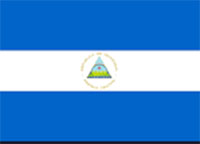
Nicaraguan Wins Miss Universe. The 2023 Miss Universe pageant was held in San Salvador, the capital of El Salvador on November 18. History was made as the winner chosen was the first time that someone from Central America was chosen to be Miss Universe.
 |
| Winner - Sheynnis Palacios Cornejo |
Eighty-four women from around the world competed for the crown in the 72nd edition of the competition. The crown was one by Miss Sheynnis Palacios Cornejo, a 23-year-old (born May 30, 2000) communicologist, originally from the municipality of Diriamba, in Carazo province. The social communicator worked before her coronation as host and presenter of the program Entiende tu Mente (Understand your Mind), which is broadcast on Nicaraguan television. Miss Palacios said she wants to work to promote mental health after suffering debilitating bouts of anxiety herself.
In Nicaragua, thousands took to the streets of Managua, Diriamba, Jinotega, Matagalpa and other cities in the country to celebrate and wave the blue and white flag.
Congratulations Miss Palacios!
UPDATE: A couple of days after conclusion of the Pageant the Nicaraguan government refused re-entry to Karen Celebertti, the owner of the Miss Nicaragua Pageant and a Nicaraguan national and her daughter. Instead they placed them on a flight to Mexico. According to opposition reports the government has begun a campaign to paint Miss Palacios as anti-government and even dragged videos of her waving a national flag at a rally during the troublesome time some five years ago when some 350 were killed.
Another thing that rankled the Ortegas (both President Daniel Ortega and Vice-President Rosario Murillo Ortega) was the winner´s use of white gowns with a blue cape, the color symbols associated with Nicaragua's patron saint, the Virgin of the Immaculate Conception -- an important symbol in Nicaragua amid a government crackdown on the Catholic Church. Said Monsignor Silvio Baez, auxiliary bishop of Managua, from his exile in the U.S., "Thank you for bringing joy to our suffering people, thank you for giving us hope,"
The government´s action was cerrtainly one way of taking the enthusiasm out of a national achievement.
Venezuela
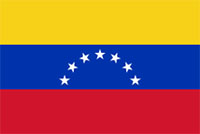 Supreme Court Vacates Election. On October 22, a primary election was held by the National Primary Commission to select a candidate to run against the current President, Nicolis Maduro. It was won by Señora María Corina Machado. On Monday, October 30 the Electoral Chamber of the Supreme Court of Justice of Venezuela (TSJ), sort of the same as the TSE mentioned in the article on El Salvador above, suspended (read vacated) the election. Instead the representative of the Vente Venezuela party was chosen by opposition voters to be the rival of President Nicolás Maduro in the 2024 presidential elections.
Supreme Court Vacates Election. On October 22, a primary election was held by the National Primary Commission to select a candidate to run against the current President, Nicolis Maduro. It was won by Señora María Corina Machado. On Monday, October 30 the Electoral Chamber of the Supreme Court of Justice of Venezuela (TSJ), sort of the same as the TSE mentioned in the article on El Salvador above, suspended (read vacated) the election. Instead the representative of the Vente Venezuela party was chosen by opposition voters to be the rival of President Nicolás Maduro in the 2024 presidential elections.
 |
| Señora María Corina Machado |
An interesting sidelight was that an agreement was signed a few days prior between the government and the opposition, which included, among other electoral guarantees, “the authorization of all presidential candidates, as long as they comply with the requirements established by law.” On the basis of that agreement the U.S. had lifted some sanctions but in the face of the nullification of the primary election the U.S. and other countries are now terming the action "fraudulent" and threatening to reinstate the sanctions.
The TSJ has requested various documents pertaining to the minutes and the constitution of the polling stations, the voting notebooks, the voting ballots and the minutes of ballot counts, among others. On the other side, the Venezuelan Prosecutor´s Office has opened a criminal investigation against the members of the National Primary Commission.
No equanimical resolution of the opposing forces is currently in sight.
¡A Machete!
TOP
Feature: Christmas in Costa Rica
(Lights, Jesus, Portals, Parties, Trees, and Bulls)
Navidad (Christmas) is one of the more celebrated holidays in Costa Rica. Not only is it a time of great family renewal, but it also is an occasion for celebrating national traditions both religious and social.
Beginning The Christmas Season
 |
| Festival of Lights - San José |
 |
| Bright Lights Boat Parade - Quepos |
Christmas Season is considered commenced when the capital city, San José, holds its Festival of Lights (Festival de la Luz) Parade, typically celebrated on the second Saturday of December beginning at 6 p.m. This parade may attract up to 1,500 musicians and up to one million spectators (yup, that´s right, one million).
Of course, other places in the country will celebrate also and in their own way. In Quepos at our Marina Pez Vela the San José celebration is paralleled with the "Bright Lites" Boat Parade (read more on the Boat Parade HERE). And I´m sure that there are other parallel light celebrations in many other places around the country.
Religious Significance
Any discussion of Christmas in Costa Rica must include an appreciation for the religious significance of the holiday to Costa Ricans.
Costa Rica is primarily a Christian country with estimates and surveys (like those done by the University of Costa Rica as recently as 2019) showing that more than 70% of Costa Ricans identify as being Catholic, an additional 22% identifying as being Protestant, with the majority of the latter being Evangelical Christians. The remaining balance are either non-religious or represent a small fraction of the population.
Jesus and Portals
Recall that the current constitution, structured after the 1948 civil war, actually included Catholicism as the national religion. Also, remember that the same constitution prohibits the state from impeding the free exercise of religions that do not "impugn universal morality or proper behavior” and the document also provides for redress in cases of alleged violations of religious freedom.
 |
| A Christmas Portal |
So the birth of Jesus is the fundamental focus of the vast majority of Costa Ricans. What we gringos call a manger or crèche or nativity scene is simply called a portal (por-tal - pronunciation emphasis second syllable). There will be literally thousands of these proffered around the country as Christmas approaches.
Costa Ricans take great pride in displaying their portals, some of the pieces of which go back several family generations and some which are quite artistic, elaborate and so real as to make you believe you´re really part of the scene.
It is also important to realize that in the local tradition, Santa Claus is a truly mythical figure but he is not the dude who brings presents. On Christmas Eve, the baby Jesus is placed in the cradle in the portal and Jesus is credited as the one who brings the presents.
Parties
 |
| Tamales |
 |
| Tres Leches |
 |
| Queque Navideño |
In Quepos there is always a parade of the faithful that carries various religious articles including pieces for the church´s own portal to the local church. After midnight mass, also referred to as "Buena Noche", many people gather at family homes to celebrate with food and libations of various kinds.
Some of the favorite and traditional foods include tamales (top photo right). N.B., there is serious competition in creating stuffing for these which is unique and deliciously outstanding. Also common are pork dishes such as pierno de cerdo asado or roast leg of pork.
Meals may be finished off with classic desserts like tres leches cake (middle photo right), sponge cake soaked in three kinds of milk: evaporated, condensed and whole.) or queque navideño, a Costa Rican version of fruit and nut cake shown in the photo lower right (yum).
Christmas Trees
 In a land filled with many and varied forests including many deciduous varieties such as pine, spruce and cypress, there is always an ample supply of Christmas trees and that´s good because many Costa Ricans want a Christmas tree and some want more that one.
In a land filled with many and varied forests including many deciduous varieties such as pine, spruce and cypress, there is always an ample supply of Christmas trees and that´s good because many Costa Ricans want a Christmas tree and some want more that one.
Probably the most famous Christmas tree erection in Costa Rica is the one outside the Hospital de Los Niños in San José (photo left). Its size and lighting attract large crowds each December when it´s lit up.
One year recently I received a call from a close Tico friend who asked if I had gotten my tree yet. Being remiss in doing so, I hemmed and hawed that I hadn´t yet gotten around to buying it yet. Without hesitation he said "I´ll be there in 15 minutes and we´ll go choose one". He actually showed up on time without an addendent 15 minutes tico/time extension! When we got the tree back home to my place his wife had already arrived and the three of us put the decorations together and voila! I remember taking a photo of it but I´ll be darned if I can find that picture now.
Yet that joint venture with my Tico friends sticks in my mind as a great time truly filled with holiday spirit.
Bulls
Another Christmas tradition in Costa Rica is "bullfighting". I put the word in quotes because in fact Costa Rican law prohibits injuring the bull in any way, so there are no swords, picks or other harmful tools employed, In fact, there are no tools at all as this is not ritualized combat. The "matadors" are voluntary runners.
 Consequently this type of "bullfighting" is not like the Spanish historical matador versus bull type of challenge where the bull ends up for dinner. No, instead this is more like the annual Running of the Bulls that occurs in Pamplona (except there is only one bull) and, of course, the affair is done in the bull ring rather than in the streets.
Consequently this type of "bullfighting" is not like the Spanish historical matador versus bull type of challenge where the bull ends up for dinner. No, instead this is more like the annual Running of the Bulls that occurs in Pamplona (except there is only one bull) and, of course, the affair is done in the bull ring rather than in the streets.
Basically anyone who wants to try their skill at exciting the bull with their presence; and then escape from the angry bull, is welcome into the ring. In order to participate in what can be dangerous for the participants, officials need to be persuaded by the participants that they´re fit, sober and sane enough before being allowed to volunteer. Unfortunately injuries do occur and even an occasional death so there is a movement growing to make even this type of bullfighting illegal. At this time it continues as a tradition. Unlike traditional bullfighting, this type tends to make the bulls more famous than the "matadors".
So, you can see that there are many Christmas traditions in Costa Rica that involve religious devotion, family, parties, celebrations and symbols. For more of what GG has written about regarding Christmas in Costa Rica, go here:
Christmas Traditions I: Edition 40 - Christmas in Costa Rica
Christmas Traditions II: Edition 52 - Christmas in Costa Rica
Christmas in Costa Rica: Edition 88 - Feliz Navidad
¡Felice Navidad!
TOP
Rumble and Weather Talk
(Shaky Happenings & Weather Observations About the Pacific Rim)
Rumbling -
In reviewing the tremor activity around Costa Rica in November the only thing I could come up with was a 4.7R shaker that occurred in the north central part of the country near the Nicaragua border on Thursday, November 23 (Thanksgiving Day). The shaker happened at about 1 AM and, if it was felt at all in the Quepos region, did not disturb the Golden Gringo´s sleep. Other than that the month was pretty quiet.
Check Out Recent Earthquakes All Around the
World Posted by U.S.G.S. Recent Quakes
|
Weather - 2024 Expected To Be A Scorcher
 |
| Guanacaste Drought 2014 |
The Instituto Meteorológico Nacional (IMN) or national weather service issued a warning recently that the north and central parts of the country, particularly Guanacaste, should expect an increasing drought brought on by the El Niño to last at least until April 2024. It may even exceed average historical high temperatures by as much as two degrees Celsius (almost 4F).
As IMN put it: "A drought like this "is emerging as a challenge that will demand preventive measures and careful management of water resources." What impact will it have on agriculture and wildlife? Vamos a ver (we´ll see).
¡Pura Vida!
TOP
Search the GGC Archives for Topics That Interest You
You can use our Archives to search for anything that has been written in more than 320 feature articles of the Golden Gringo Chronicles plus find Broken News items and ROMEO restaurant reviews. Enter your topic or item to search in the Google Search Routine below and follow the links offered from the search results.
Suggestion: Enter only a simple, precise and unique as possible key word or two in order to narrow the number of references retrieved:
Golden Gringo Chronicles - Enter Search Here
Readers: Our publication is open to suggestions regarding future articles
and will accept pieces written by others but we reserve the right to decline
anything that the
editorial staff (that's GG) thinks is inappropriate for this format. Send proposals, comments, suggestions, ideas, meaningless statements and jocular observations concerning the Chronicles to GG here: gg@goldengringo.com.
Feature: Army Abolition Day
(Why Costa Rica Has No Army)
December 1, 2023 is celebrated as the 75th anniversary of the current and Second Republic of Costa Rica.
 |
| José Hippolito Figueres Ferrer |
The last Costa Rican Civil War lasted only 44 days, from March 12 to April 24, 1948, yet caused approximately 2,000 fatalities. It was triggered by the nullification of the national election results by then President Teodoro Picado.
After conclusion of the war rebel leader and new President, José Hippolito Figueres Ferrer declared the beginning of the new republic including a new democratic constitution. Figueres has ever since been considered the father of the Second Republic. An integral part of the new constitution was the abolition of the army and military. The holiday now celebrated is known as Día de la Abolición del Ejército (Army Abolition Day) and was declared a national holiday in 1986 by then President Oscar Arias Sánchez .
Unlike its neighbors in Central America, Costa Rica has not endured a civil war since 1948 while there have been a number of others in the region of significant length during that period (Guatemala 1960-1996, Nicaragua 1978-1990, El Salvador 1979-1992, Honduras 1957-1969 and 1982-1896, Panama 1989-1990). The country prides itself on diverting the funds previously used for the military into education and social concerns. Education figures as a percent of GDP number supports this as recent data shows Costa Rica spending 6-6.5% of GDP versus the top country of Norway at 6.7% (U.S. - 6.0%, Spain - 4.3%, Russia 3.4%).
As a result of the new constitution the Army was disbanded. In 1996, the Ministry of Public Security established the Fuerza Pública or Public Force, similar to a national police. At the same time the Civil Guard, Rural Assistance Guard, and Frontier Guards, formerly closely aligned with the military were reorganized and eliminated as separate entities. Now the Fuerza Pública is responsible for ground security, law enforcement, counter-narcotics, border patrol, and tourism security functions.
 |
| UEI Sniper Training - Colombia 2014 |
The closest thing to a military currently in Costa Rica is what is called a Special Intervention Unit named the Unidad Especial De Intervención (UEI), a military-like force of some 70 personnel currently. This group, essentially an elite commando force, trains with special forces from around the world but is not part of the main police forces. Yet it does participate in the biennial war game sponsored by the U.S. military’s Southern Command. As Marion Figueres, son of the Father of the Second Republic and and head of the Department of Intelligence and Security which commands the UEI puts it: “The UEI is an intervention unit for police and not military purposes.” You know, like drug busts and such.
Costa Rica has no army, but because of the UEI, Costa Rica is considered as having "limited military". Other countries that fall into the limited military category are Iceland,
Monaco,
Mauritius,
Panama and
Vanuatu. Those countries considered as having no army, not even limited military include Andorra,
Solomon Islands,
St. Lucia,
Palau,
Samoa,
Federated States of Micronesia,
St. Vincent and the Grenadines,
Dominica,
Haiti,
Liechtenstein,
Grenada,
Kiribati,
Marshall Islands,
Nauru,
Tuvalu,
Vatican City.
Vatican City eh? I´m personally grateful the Pope doesn´t have any snipers (yuk,yuk).
¡Pura Vida!
TOP
¿Que es Eso? Department (¿What is That?)

Get out!?
Might be that it´s a plastic toy for kids?
Or a wax puppet that came into contact with some red paint?
Answer in
What´s-in-a-Word
Section Below
¡Pura Vida!
TOP
Health Stuff
| Note: The information given in this section is offered as news information only and does not indicate GGC confirmation or denial of the accuracy of the treatment or a recommendation to pursue it, nor can we or do we guarantee the efficacy of the results nor validity of the conclusions proffered.
(How's that for a disclaimer amigos?) |
CCSS Planning Co-Pay For Services
If you´ve ever had an extended or complex procedure within the Costa Rican National Health System (CCSS - Caja Costarricense de Seguro Social, also known as the CAJA or Cah-Hah, you know that waiting times to get the procedure done can be significant. It was recently announced that CCSS is beginning a national discussion and debate on the best ways to reduce these waiting times.
 |
| Chaves, Esquival & Artavia |
On Thursday, November 7, a campaign called “menos espera, mejor servicio” (less waiting, better service) was signed by Señor Rodrigo Chaves, President of the Republic, Señora Marta Esquivel, Executive President of CCSS and Señora Gabriela Artavia, CCSS Financial Manager (photo right). Señora Esquivel´s statement was a challenge: “We are going to buy services, apply shared payment and refine the costs of the Caja to meet the goals, we are going to go against all odds, those who support us are welcome and those who do not, don’t get in our way!” Wilburg Díaz, CCSS Medical Manager reiterated that for the application of co-pay, financial analysis and determination of the percentages needs yet to be proposed.
Of course changes of this nature will require legislative approval and referring to going "against all odds" probably reflects the realization that the current government´s party in the legislature controls only 10 votes out of the total 57. A couple of unions have already indicated their uneasiness with the idea, to wit: The Sindicato Nacional de Enfermería y Afines (SINAE-AFINES) – National Union of Nursing and Allied Workers – labeled the situation as more promises without actions and as it is a proposal that the board of directors is unaware of. The Unión Nacional de Empleados de la Caja y la Seguridad Social (UNDECA) – National Union of Caja and Social Security Employees – also joined in criticizing the Government’s announcement.
Vamos a ver amigos (we´ll see what happens).
¡Pura Vida!
TOP
Travel Quote of the Month

“I travel not to go anywhere, but to go. I travel for travel's sake.
The great affair is to move.”
Robert Louis Stevenson, Travels with a Donkey in the Cévennes
¡A Cachete!
TOP
GGC Bookshelf
 GGC Publications Group is the parent organization that publishes the Golden Gringo Chronicles as well as a number of books and paraphernalia related to the Chronicles and Costa Rica. The GGC Bookshelf also includes works from a number of other authors that belong to the Quepos-Manuel Antonio Writers Group in which GGC has been a founding member.
GGC Publications Group is the parent organization that publishes the Golden Gringo Chronicles as well as a number of books and paraphernalia related to the Chronicles and Costa Rica. The GGC Bookshelf also includes works from a number of other authors that belong to the Quepos-Manuel Antonio Writers Group in which GGC has been a founding member.
Here are the books currently on our bookshelf:
All of the above books are available on Amazon.com and the "Read More" links above will lead you to them. You can find more detail on all of them on our GGC Publications Page.
GGC Products Store
GGC Publications also offers some accessories and paraphernalia related to the Chronicles and with Costa Rican themes, to wit:
T-Shirts:

a. Golden Gringo Chronicles with Logo
b. Official Golden Gringo with Monkey on Banana Hammock
c. ¡Quepo en Quepos! ("I Fit In Quepos!") with Photo of Quepos
d. Wanna Monkey Around? - Come on Down! (shown) with Photo of White Faced Monkey, e. It's OK to be Slothful with photo of Three-Toed Sloth.
The t-shirts are available in several themes, colors, styles and sizes. See them all
HERE.
Coffee Mugs:
a. Golden Gringo, b. Wanna Monkey Around?, c. It's OK to be Slothful
See them all HERE:
What's life without a great cup of Costa Rican coffee? And it tastes even better in a Golden Gringo Chronicles mug!
To see ALL the products available in the Golden Gringo Store go here: GGC Store.
¡Solo Bueno!
What's-in-a-Word
"Tell me and I forget; teach me and I remember; involve me and I learn"– Benjamin Franklin
Answer to Que Es Eso
 A Japanese photographer was rummaging around a national park in Siguerres, Costa Rica in the mountains a little over half way from San José to Limón when he came across this bug with the strange face and a body like a grasshopper. This is actually a katydid that goes by the name of "Pitbull Katydid".
A Japanese photographer was rummaging around a national park in Siguerres, Costa Rica in the mountains a little over half way from San José to Limón when he came across this bug with the strange face and a body like a grasshopper. This is actually a katydid that goes by the name of "Pitbull Katydid".
There´s no limit to the wonders in paradise.
¡Konnichiwa! こんにちは
TOP
ROMEO Corner
(Retired Old Men Eating Out)
MANGATA Peruvian Restaurant, Quepos
 Location: Approximately half a kilometer from Quepos Bridge heading out of town, on the left.
Location: Approximately half a kilometer from Quepos Bridge heading out of town, on the left.
Parking: On streets in front and side of the restaurant.
Hours:Monday: Closed;
Tuesday-Wednesday-Thursday 12pm-10pm;
Friday-Saturday-Sunday 12pm - 11pm
Sunday:12:00 pm – 9:00 pm.
Contacts: Tel.: 506-2777-2735; Email: N/A; Website: Trip Adviser
Reviewing ROMEOS: Alma L., Bob N., Carl M., Glen N., Jorge M., Ken M., Lawrence L., Mark P.
Refer To Our Rating System Here: R.O.M.E.O. Rating System
 This restaurant is new to the area and occupies a former restaurant space that used to be called Kekula. Being focused on Peruvian cuisine now, the staff is all new and GG noticed that the dining room, bar and visible part of the kitchen have been substantially cleaned up and polished compared to the previous restaurant.
This restaurant is new to the area and occupies a former restaurant space that used to be called Kekula. Being focused on Peruvian cuisine now, the staff is all new and GG noticed that the dining room, bar and visible part of the kitchen have been substantially cleaned up and polished compared to the previous restaurant.
The dining room (right) with its indirect light and warm wood tones comes across as a pleasant atmosphere in which to have a good meal with family or friends. One note mentioned by a couple of the diners was the fact that being situated on one of the busiest streets in Quepos made for some fairly strong background noise occasionally.
The composite score for ambiance came in at 3.9 out of a max of 5.0.
The menu proffered was quite extensive and, as expected, heavily influenced in Peruvian style cooking. We were provided with a lexicon of topics and English equivalents which was very helpful. The menu contained an ample array of appetizers, ceviches, soups, and salteado (stir fry) dishes containing chicken, tenderloin and seafood.
GG chose to try Las Chaufas, described as chicken, tenderloin, seafood or a mix of all three (GG´s selection) in a wok stir fry to which was added fresh vegetables, sticks of wonton-like strands and an assortment of sauces of various spice levels to dip into. On top of this concoction was a fried egg (now that´s Latino!). The flavors were exceptional and the amount provided in a large bowl gave rise to a take home platter for later to be enjoyed again (just as good the 2nd time).
Other ROMEOs selected a tuna bowl, chicken chaufas, the daily fish special and several kinds of ceviches. The composite score for Food Quality came in at 4.8/5.0 (they don´t get much better than that).
|
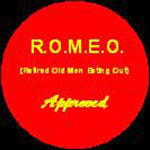 |
.jpg) .54 .54 |
| $$$.6 |
Value Index= 126 |
 |
| ROMEOs Hard at Work |
We were serviced by a young man named Chris who some of us knew from other business endeavors, and a lady named Barbara. Both were attentive, patient and courteous which added to our enjoyment of the meal. GG would note that we were served all eight of our meals (almost at the same time and within a 1/2 hour of ordering, which is fast for this part of the world. The composite score for Service came in at 4.9/5.0, again very high. That resulted in an average for ambiance, food quality and service of 3.9+4-8+4.9/3=4.54
GG´s Chaufas Mangata (containing the mix of meat and seafood) and proverbial ginger ale Michelada came in at 11,550 colones or just about $22.65, a very good price for this area. The composite for Cost came in at 3.6/5.0, a very reasonable rating for this area. That equals a Value Index of 4.54/3.6= 126 and puts Mangata in the top 1/3 of all the restaurants for value that we´ve evaluated in this area.
The ROMEOs can report that our new Mangata restaurant is a great place to try somewhat different yet very tasty and enjoyable Latin cuisine at a reasonable price.
TOP
Opt-In Here to Receive Your Free Monthly Copy Of
The Golden Gringo Chronicles
The Golden Gringo Chronicles is a free newsletter that is non-political, non-commercial and, hopefully, informative and entertaining. By signing up you will receive an email each month around the first of the month giving you the links to the latest edition as well as to each individual feature and departmental section.
CLICK HERE TO SIGN-UP FOR THE GOLDEN GRINGO CHRONICLES
or Email me at gg@goldengringo.com, or use our Website at: www.goldengringo.com
Bob Normand, Editor & The Golden Gringo
Pura Vida!
To Contact GGC World Headquarters (yuk, yuk) to makecomments, suggest topics or criticize my bad jokes, just send an email to: gg@goldengringo.com.
Be pithy but kind; I'm sensitive.
Unsubscribe from Golden Gringo Chronicles
GGC Publications
Golden Gringo Chronicles
Quepos, Puntarenas, Costa Rica
Copyright ©2008-2023 All Rights Reserved






 Labor law in a number of Latin countries, including Costa Rica, includes a provision for the payment of an additional month or more of salary as a bonus. In Costa Rica the "13th month" salary is called an Aguinaldo and is required by law to be paid to all salaried workers in both public and private sectors within the first 20 days of December. Typically here the amount is calculated as the average monthly salary paid between December 1 of the previous year and November 30 of the current year.
Labor law in a number of Latin countries, including Costa Rica, includes a provision for the payment of an additional month or more of salary as a bonus. In Costa Rica the "13th month" salary is called an Aguinaldo and is required by law to be paid to all salaried workers in both public and private sectors within the first 20 days of December. Typically here the amount is calculated as the average monthly salary paid between December 1 of the previous year and November 30 of the current year. Javier Milei Elected New President. In an unsurprising second round of voting, the anti-peronista party won out 55% to 44% and elected Javier Milei as the new president. Milei is described as "a libertarian committed to reducing the size of the State and dollarizing the economy."
Javier Milei Elected New President. In an unsurprising second round of voting, the anti-peronista party won out 55% to 44% and elected Javier Milei as the new president. Milei is described as "a libertarian committed to reducing the size of the State and dollarizing the economy." 
 To emphasize his point about the fragile Argentine Peso during the campaign Milei had a dummy $100 bill printed up with his face on it (photo left). The posted official exchange rate for the Peso today is about 355 Pesos = $1.
To emphasize his point about the fragile Argentine Peso during the campaign Milei had a dummy $100 bill printed up with his face on it (photo left). The posted official exchange rate for the Peso today is about 355 Pesos = $1.  Illegal Hippo Problem!? Pablo Escobar, the notorious founder of the Medellin Cartel, had an unusual hobby when he was living; he collected hippopotamuses (or, if you prefer, hippopotami). He brought several of these huge creatures, not native to Colombia and illegal in that country in the 1970's and their progeny have since proliferated to almost 200.
Illegal Hippo Problem!? Pablo Escobar, the notorious founder of the Medellin Cartel, had an unusual hobby when he was living; he collected hippopotamuses (or, if you prefer, hippopotami). He brought several of these huge creatures, not native to Colombia and illegal in that country in the 1970's and their progeny have since proliferated to almost 200.  The beasts escaped from Escobar´s ponds to the rivers. If left unchecked, forecasts are that they might number 1,000 in about 10 years. The only natural predators to hippopotamuses are crocodiles, lions, hyenas, humans and other hippos; the lions and hyenas are not prevalent in Colombia and many of the croc species are endangered.
The beasts escaped from Escobar´s ponds to the rivers. If left unchecked, forecasts are that they might number 1,000 in about 10 years. The only natural predators to hippopotamuses are crocodiles, lions, hyenas, humans and other hippos; the lions and hyenas are not prevalent in Colombia and many of the croc species are endangered. Bukele To Run for Re-Election. Constitutional crisis is a-brewing in El Salvador.
Bukele To Run for Re-Election. Constitutional crisis is a-brewing in El Salvador. 


 Supreme Court Vacates Election. On October 22, a primary election was held by the National Primary Commission to select a candidate to run against the current President, Nicolis Maduro. It was won by Señora María Corina Machado. On Monday, October 30 the Electoral Chamber of the Supreme Court of Justice of Venezuela (TSJ), sort of the same as the TSE mentioned in the article on El Salvador above, suspended (read vacated) the election. Instead the representative of the Vente Venezuela party was chosen by opposition voters to be the rival of President Nicolás Maduro in the 2024 presidential elections.
Supreme Court Vacates Election. On October 22, a primary election was held by the National Primary Commission to select a candidate to run against the current President, Nicolis Maduro. It was won by Señora María Corina Machado. On Monday, October 30 the Electoral Chamber of the Supreme Court of Justice of Venezuela (TSJ), sort of the same as the TSE mentioned in the article on El Salvador above, suspended (read vacated) the election. Instead the representative of the Vente Venezuela party was chosen by opposition voters to be the rival of President Nicolás Maduro in the 2024 presidential elections.






 In a land filled with many and varied forests including many deciduous varieties such as pine, spruce and cypress, there is always an ample supply of Christmas trees and that´s good because many Costa Ricans want a Christmas tree and some want more that one.
In a land filled with many and varied forests including many deciduous varieties such as pine, spruce and cypress, there is always an ample supply of Christmas trees and that´s good because many Costa Ricans want a Christmas tree and some want more that one.  Consequently this type of "bullfighting" is not like the Spanish historical matador versus bull type of challenge where the bull ends up for dinner. No, instead this is more like the annual Running of the Bulls that occurs in Pamplona (except there is only one bull) and, of course, the affair is done in the bull ring rather than in the streets.
Consequently this type of "bullfighting" is not like the Spanish historical matador versus bull type of challenge where the bull ends up for dinner. No, instead this is more like the annual Running of the Bulls that occurs in Pamplona (except there is only one bull) and, of course, the affair is done in the bull ring rather than in the streets. 







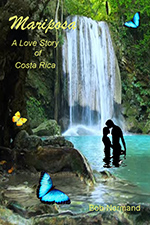




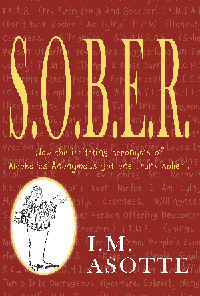












 A Japanese photographer was rummaging around a national park in Siguerres, Costa Rica in the mountains a little over half way from San José to Limón when he came across this bug with the strange face and a body like a grasshopper. This is actually a katydid that goes by the name of "Pitbull Katydid".
A Japanese photographer was rummaging around a national park in Siguerres, Costa Rica in the mountains a little over half way from San José to Limón when he came across this bug with the strange face and a body like a grasshopper. This is actually a katydid that goes by the name of "Pitbull Katydid".  Location: Approximately half a kilometer from Quepos Bridge heading out of town, on the left.
Location: Approximately half a kilometer from Quepos Bridge heading out of town, on the left. This restaurant is new to the area and occupies a former restaurant space that used to be called Kekula. Being focused on Peruvian cuisine now, the staff is all new and GG noticed that the dining room, bar and visible part of the kitchen have been substantially cleaned up and polished compared to the previous restaurant.
This restaurant is new to the area and occupies a former restaurant space that used to be called Kekula. Being focused on Peruvian cuisine now, the staff is all new and GG noticed that the dining room, bar and visible part of the kitchen have been substantially cleaned up and polished compared to the previous restaurant.
